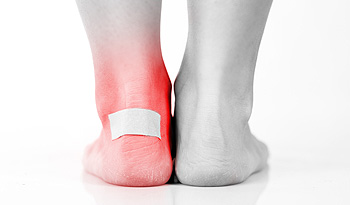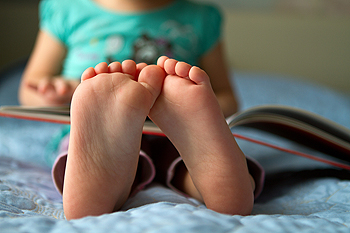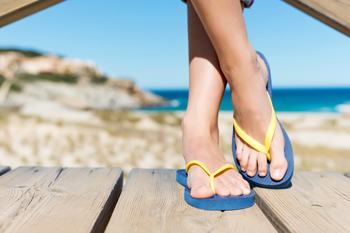Freehold (732) 294-9393
Freehold (732) 294-9393
 Blisters are an inconvenience almost everyone has faced at least once. Blisters are the result of friction between your skin and your footwear. They are most commonly found on the back of the ankle and can cause discomfort during daily activities. It is best to keep the blister covered with a small bandage, because keeping it exposed will cause pain, but also might lead to the blister popping. Keeping the blister from popping is key in the healing process. The skin that is exposed after a blister is popped is raw and prone to infection. Infection can cause more complications and pain, so it is best to try to keep it covered and avoid popping it. If it does accidentally pop, then bandaging it becomes even more essential, because this will help protect the small wound from harmful bacteria. If you have a blister that you are concerned about, then it is recommended you speak with a podiatrist to learn how to properly take care of it.
Blisters are an inconvenience almost everyone has faced at least once. Blisters are the result of friction between your skin and your footwear. They are most commonly found on the back of the ankle and can cause discomfort during daily activities. It is best to keep the blister covered with a small bandage, because keeping it exposed will cause pain, but also might lead to the blister popping. Keeping the blister from popping is key in the healing process. The skin that is exposed after a blister is popped is raw and prone to infection. Infection can cause more complications and pain, so it is best to try to keep it covered and avoid popping it. If it does accidentally pop, then bandaging it becomes even more essential, because this will help protect the small wound from harmful bacteria. If you have a blister that you are concerned about, then it is recommended you speak with a podiatrist to learn how to properly take care of it.
Blisters may appear as a single bubble or in a cluster. They can cause a lot of pain and may be filled with pus, blood, or watery serum. If your feet are hurting, contact Dr. Henry Miller of New Jersey. Our doctor can provide the care you need to keep you pain-free and on your feet.
Foot Blisters
Foot blisters are often the result of friction. This happens due to the constant rubbing from shoes, which can lead to pain.
What Are Foot Blisters?
A foot blister is a small fluid-filled pocket that forms on the upper-most layer of the skin. Blisters are filled with clear fluid and can lead to blood drainage or pus if the area becomes infected.
Symptoms
(Blister symptoms may vary depending on what is causing them)
Prevention & Treatment
In order to prevent blisters, you should be sure to wear comfortable shoes with socks that cushion your feet and absorb sweat. Breaking a blister open may increase your chances of developing an infection. However, if your blister breaks, you should wash the area with soap and water immediately and then apply a bandage to the affected area. If your blisters cause severe pain it is important that you call your podiatrist right away.
If you have any questions, please feel free to contact our office located in Freehold, NJ . We offer the newest diagnostic and treatment technologies for all your foot care needs.
 Research has indicated it typically takes a child's foot approximately eighteen years to fully develop. Many children are active and enjoy running, jumping, and dancing, and this may help the bones and muscles to gradually become stronger. It is beneficial for children to wear shoes and socks that fit properly, which may include making sure there is adequate room for the toes to move freely in. Walking barefoot indoors may help the arches and toes to become stronger, and this may positively affect the overall health of the foot. The growth rate of a baby’s foot is fastest during the first three years, and proper measuring should occur every six to eight weeks. Many children are born with flat feet, and the arches will eventually develop. If you notice the arch is not forming as it should, or if your child complains of foot pain, it is suggested to seek the counsel of a podiatrist who can properly assist you in determining the cause of any foot discomfort your child may have.
Research has indicated it typically takes a child's foot approximately eighteen years to fully develop. Many children are active and enjoy running, jumping, and dancing, and this may help the bones and muscles to gradually become stronger. It is beneficial for children to wear shoes and socks that fit properly, which may include making sure there is adequate room for the toes to move freely in. Walking barefoot indoors may help the arches and toes to become stronger, and this may positively affect the overall health of the foot. The growth rate of a baby’s foot is fastest during the first three years, and proper measuring should occur every six to eight weeks. Many children are born with flat feet, and the arches will eventually develop. If you notice the arch is not forming as it should, or if your child complains of foot pain, it is suggested to seek the counsel of a podiatrist who can properly assist you in determining the cause of any foot discomfort your child may have.
The health of a child’s feet is vital to their overall well-being. If you have any questions regarding foot health, contact Dr. Henry Miller of New Jersey. Our doctor can provide the care you need to keep you pain-free and on your feet.
Tips for Keeping Children's Feet Healthy
If you have any questions, please feel free to contact our office located in Freehold, NJ . We offer the newest diagnostic and treatment technologies for all your foot care needs.
 While flip flops are easy to slip into, they may not be the best for your feet. This may be due to inadequate support, and uncomfortable foot conditions may develop as a result of this. These open back shoes may cause a condition known as fissures o the heels to develop, in addition to possible injuries to the Achilles tendon. As they are worn, the toes may have a tendency to tense, which may be a natural reaction to ensure they are stable in the shoe. Additionally, the band of tissue that is referred to as the plantar fascia may become injured, and this may typically cause severe pain and discomfort. Blisters may be a common occurrence while wearing flip flops, and this may often be a result of excessive friction caused by rubbing that occurs between the toes. If you are experiencing any foot pain that may have been caused by wearing flip flops, it is suggested to consult with a podiatrist who can properly treat any foot condition.
While flip flops are easy to slip into, they may not be the best for your feet. This may be due to inadequate support, and uncomfortable foot conditions may develop as a result of this. These open back shoes may cause a condition known as fissures o the heels to develop, in addition to possible injuries to the Achilles tendon. As they are worn, the toes may have a tendency to tense, which may be a natural reaction to ensure they are stable in the shoe. Additionally, the band of tissue that is referred to as the plantar fascia may become injured, and this may typically cause severe pain and discomfort. Blisters may be a common occurrence while wearing flip flops, and this may often be a result of excessive friction caused by rubbing that occurs between the toes. If you are experiencing any foot pain that may have been caused by wearing flip flops, it is suggested to consult with a podiatrist who can properly treat any foot condition.
Flip-flops can cause a lot of problems for your feet. If you have any concerns about your feet or ankles, contact Dr. Henry Miller from New Jersey. Our doctor will assist you with all of your foot and ankle needs.
Flip-Flops and Feet
Flip-flops have managed to become a summer essential for a lot of people. While the shoes may be stylish and easy to slip on and off, they can be dangerous to those who wear them too often. These shoes might protect you from fungal infections such as athlete’s foot, but they can also give you foot pain and sprained ankles if you trip while wearing them.
When Are They Okay to Wear?
Flip-flops should only be worn for very short periods of time. They can help protect your feet in places that are crawling with fungi, such as gym locker rooms. Athlete’s foot and plantar warts are two common fungi that flip-flops may help protect your feet against.
Why Are They Bad for My Feet?
These shoes do not offer any arch support, so they are not ideal for everyday use. They also do not provide shock absorption or heel cushioning which can be problematic for your feet. Additionally, you may suffer from glass cuts, puncture wounds, and stubbed toes since they offer little protection for your feet.
More Reasons Why They Are Bad for Your Feet
If you have any questions, please feel free to contact our office located in Freehold, NJ . We offer the newest diagnostic and treatment technologies for all your foot care needs.
 If the nail on the big toe should grow into the surrounding skin, you may have what is known as an ingrown toenail. Common reasons why this painful condition should occur may include improper nail trimming and wearing shoes which do not fit correctly. Some patients have toes that are deformed, and this can exert excess pressure on the nail. There are several symptoms that may accompany this ailment, including redness, tenderness, swelling, or a possible discharge coming from the affected nail. Soaking the nail in warm water may lead to partial relief, in addition to gently massaging the nail and surrounding area. If you are afflicted with diabetes or nerve damage, it is important to speak to a podiatrist as quickly as possible who can aid in treating the nail and possibly preventing an infection from developing.
If the nail on the big toe should grow into the surrounding skin, you may have what is known as an ingrown toenail. Common reasons why this painful condition should occur may include improper nail trimming and wearing shoes which do not fit correctly. Some patients have toes that are deformed, and this can exert excess pressure on the nail. There are several symptoms that may accompany this ailment, including redness, tenderness, swelling, or a possible discharge coming from the affected nail. Soaking the nail in warm water may lead to partial relief, in addition to gently massaging the nail and surrounding area. If you are afflicted with diabetes or nerve damage, it is important to speak to a podiatrist as quickly as possible who can aid in treating the nail and possibly preventing an infection from developing.
Ingrown toenails can become painful if they are not treated properly. For more information about ingrown toenails, contact Dr. Henry Miller of New Jersey. Our doctor can provide the care you need to keep you pain-free and on your feet.
Ingrown Toenails
Ingrown toenails occur when a toenail grows sideways into the bed of the nail, causing pain, swelling, and possibly infection.
Causes
Prevention
Because ingrown toenails are not something found outside of shoe-wearing cultures, going barefoot as often as possible will decrease the likeliness of developing ingrown toenails. Wearing proper fitting shoes and using proper cutting techniques will also help decrease your risk of developing ingrown toenails.
Treatment
Ingrown toenails are a very treatable foot condition. In minor cases, soaking the affected area in salt or antibacterial soaps will not only help with the ingrown nail itself, but also help prevent any infections from occurring. In more severe cases, surgery is an option. In either case, speaking to your podiatrist about this condition will help you get a better understanding of specific treatment options that are right for you.
If you have any questions please feel free to contact our office located in Freehold, NJ . We offer the newest diagnostic and treatment technologies for all your foot and ankle needs.